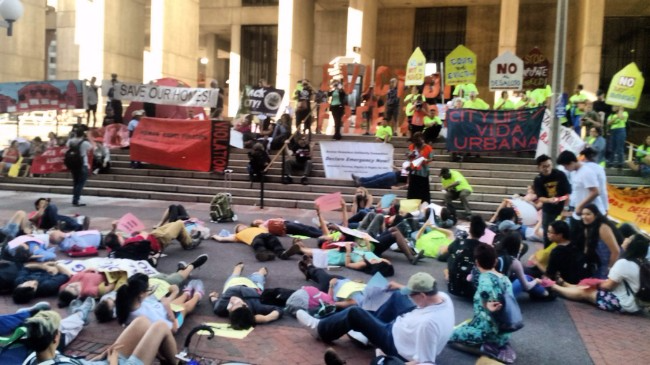Eviction Reform: ‘Just Cause Eviction’ Bad for Landlords, Worse for Tenants
| . Posted in evictions, laws, News, policy, tenant screening - 5 Comments

Image of Boston City Hall "Die In" Sep 22, 2016 likely due to Eli Gerzon, Twitter, https://twitter.com/eligerzon/status/779059797580742656. Editorial use.
By: Sherri Way, Landlord and MassLandlords Member
If we want to help low-income or bad credit tenants find housing, we must create an environment where they are not considered an unsurmountable risk to landlords.
There has been much talk over the past year about Eviction Reform in Massachusetts. Most landlords laugh when they hear this since Massachusetts is known as a very pro-tenant state. How much more are landlords supposed to endure?
The current Eviction Reform consists of:
- Requiring a tenant to be habitually late before they can be evicted for nonpayment;
- Requiring landlords to limit the rent increases to 5%/year even though rents are going up faster;
- Requiring landlords to only evict for “just cause,” meaning that if a landlord wants to have the apartment vacated because a relative is moving in or for renovations, that would not be allowed.
This was started in Boston where there have been many hearings by the Mayor and City Council on this issue. There’s also talk of new legislation being proposed on this matter at the state level with the new session starting. Landlord organizations have protested the new legislation as being a form of rent control. While this is true, the government, in most cases, doesn’t care how this impacts the landlord. The argument that landlord organizations need to voice is how “just cause eviction” will impact tenants. By showing that there is an adverse impact on tenants with the new laws, the tenant groups and the government may not be so quick to pass new laws that would be detrimental to landlords.
The central problem all parties are trying to solve is the housing deficit. It is not typically the high-end tenants that will be affected. In fact, it is the lower-end tenants and first time renters that are most impacted by the current housing crisis.
There are three groups of tenants looking for housing.
1. Good risk – these tenants are welcome to most landlords. Typically they have high credit scores and good paying jobs.
2. Bad risk – these are tenants that no landlord will take due to their level of risk (no income, bad credit etc.).
3. Moderate risk – this is the majority of tenants. Depending on the landlord’s risk aversion, these tenants may or may not be approved for an apartment.
Rents have increased significantly over the past few years which have made it difficult for some tenants to qualify for housing. These are not the tenants with the 700+ credit scores and good paying jobs, they’re the tenants that are risky – lower credit scores, lower incomes and bad or no rental history. If we want to help these tenants find housing, we must create an environment where they are not considered an unsurmountable risk to landlords. This means making it easier to evict bad tenants while still providing housing for risky tenants that are actually good tenants.
If new laws are passed which make it more difficult to remove tenants from a rental, the ‘bad risk’ group will increase in size, the ‘good risk’ group will decrease in size and those who fall under ‘moderate risk’ will either stay the same or decrease with more tenants moving into the ‘bad risk’ category. It should also be noted that, while some of the laws may keep tenants in a rental, when it comes time for them to move again it will be increasingly difficult for them to find a rental. Thus, they may end up in undesirable or unsafe rental units or worse, they might become homeless.
Therefore, to help tenants find housing, the government should work with landlords to make the laws more equitable. While public defenders and others will say that an eviction takes 12-14 days, all landlords know that this is far from the truth. If you’re lucky and everything goes smoothly, it takes 6 weeks*; I know this is from my own personal experience. If you’re unlucky, it could take even longer and become very costly. With this potential cost hanging over our heads, why would any landlord rent to someone that is a possible risk?
MassLandlords members probably all know some multi-unit home owners that have vacant units that they choose not to rent because they are very risk averse. If legislators worked with landlord groups, as well as tenant groups, to decrease the risk then maybe some of these units would open up and help with the current housing crisis. Both landlords and tenants should be contacting their legislators to explain this to them. Educate them on why new stricter eviction laws are detrimental to tenants. This is what the legislators in Massachusetts will respond to.
*Editor’s Note: the MassLandlords eviction study for Massachusetts demonstrated that in 2014, the average eviction exceeded 55 days in duration under existing laws. The longest eviction in the study period was 1 year, 3 months, 2 weeks, 2 days.




